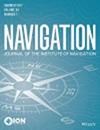基于模型导航的惯性测量小型固定翼无人机气动特性辨识
IF 2
3区 地球科学
Q1 ENGINEERING, AEROSPACE
引用次数: 0
摘要
无人机任务的成功取决于无人机姿态和速度的准确确定,这是通过融合惯性测量单元和全球导航卫星系统(GNSS)测量来共同估计的。然而,在GNSS中断期间,这些估计的长期准确性远远不能允许实际使用。相比之下,基于车辆动态模型(VDM)的导航在GNSS中断时的自主定位能力有了显著提高。这种改进是通过在传感器融合架构中结合空气动力/力矩的数学模型来实现的。然而,这种方法依赖于特定于操作车辆的空气动力学模型参数的知识。我们提出了一种新的校准算法,从两个几何形状不同的无人机的飞行数据中识别这些参数。当在VDM框架中使用确定的参数时,显示GNSS中断期间导航漂移的显着减少。结果表明,该算法不受固定翼平台选择和空气动力学先验知识的影响。本文章由计算机程序翻译,如有差异,请以英文原文为准。
Identifying Aerodynamics of Small Fixed-Wing Drones Using Inertial Measurements for Model-Based Navigation
The success of drone missions is incumbent on an accurate determination of the drone pose and velocity, which are collectively estimated by fusing inertial measurement unit and global navigation satellite system (GNSS) measurements. However, during a GNSS outage, the long-term accuracy of these estimations are far from allowing practical use. In contrast, vehicle dynamic model (VDM)-based navigation has demonstrated significant improvement in autonomous positioning during GNSS outages. This improvement is achieved by incorporating mathematical models of aerodynamic forces/moments in the sensor fusion architecture. Such an approach, however, relies on a knowledge of aerodynamic model parameters, specific to the operating vehicle. We present a novel calibration algorithm to identify these parameters from the flight data of two geometrically different drones. The identified parameters, when used in the VDM framework, show a significant reduction in navigation drift during GNSS outages. Moreover, the obtained results show that the proposed algorithm is independent of the choice of fixed-wing platform and prior knowledge of aerodynamics.
求助全文
通过发布文献求助,成功后即可免费获取论文全文。
去求助
来源期刊

Navigation-Journal of the Institute of Navigation
ENGINEERING, AEROSPACE-REMOTE SENSING
CiteScore
5.60
自引率
13.60%
发文量
31
期刊介绍:
NAVIGATION is a quarterly journal published by The Institute of Navigation. The journal publishes original, peer-reviewed articles on all areas related to the science, engineering and art of Positioning, Navigation and Timing (PNT) covering land (including indoor use), sea, air and space applications. PNT technologies of interest encompass navigation satellite systems (both global and regional), inertial navigation, electro-optical systems including LiDAR and imaging sensors, and radio-frequency ranging and timing systems, including those using signals of opportunity from communication systems and other non-traditional PNT sources. Articles about PNT algorithms and methods, such as for error characterization and mitigation, integrity analysis, PNT signal processing and multi-sensor integration, are welcome. The journal also accepts articles on non-traditional applications of PNT systems, including remote sensing of the Earth’s surface or atmosphere, as well as selected historical and survey articles.
 求助内容:
求助内容: 应助结果提醒方式:
应助结果提醒方式:


